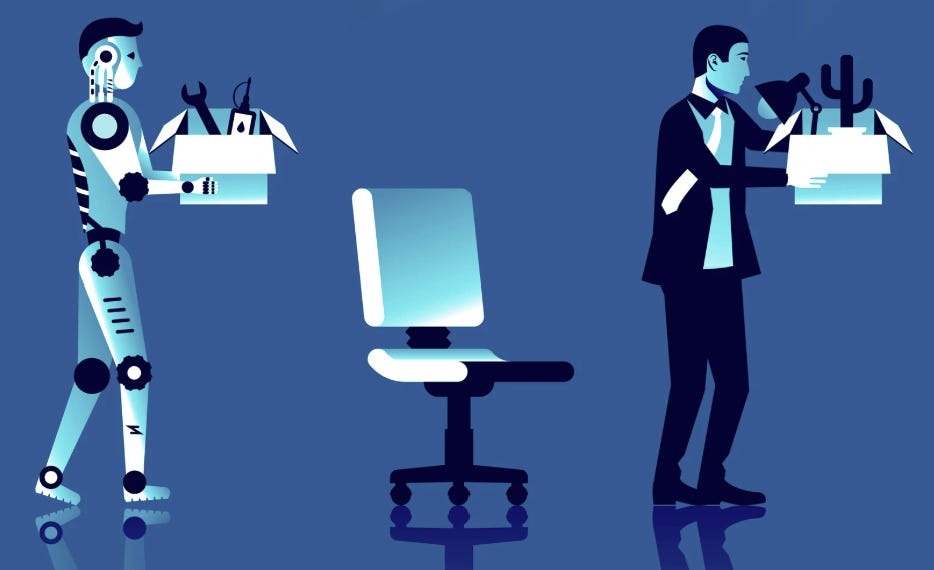AI’s Silent Takeover: 10 Supply Chain Jobs at Risk of Disappearing
As artificial intelligence reshapes industries, here are the roles in logistics and procurement that may not survive the next decade.
AI is no longer a future threat. It’s a present force. And it’s quietly rewriting the rules of work across the global supply chain.
From forecasting engines that outthink planners to autonomous bots that never sleep, AI has already started replacing humans in predictable, repeatable roles. While some leaders embrace AI to improve accuracy and resilience, others see it as a tool to trim headcount and boost margins. Either way, the impact is real - and irreversible.
According to McKinsey, up to 30% of the hours worked globally could be automated by 2030. Tens of millions of workers are expected to face “occupational transitions,” particularly in roles heavy on data entry, routine processing, or lower-skill coordination.
And the logistics sector, long reliant on process and predictability, is on the front line.
But not all roles face equal risk. Based on analysis from McKinsey, Brookings, and the Bureau of Labor Statistics - along with supply chain-specific insights - here are the 10 roles most vulnerable to AI-driven disruption.
10 Supply Chain, Procurement & Logistics Roles Most Susceptible to AI
1. Data Entry Operators (Logistics & Freight)
AI tools can now ingest, structure, and validate shipping and customs data faster - and with fewer errors - than any human. Manual entry roles will fade as NLP-powered tools extract data from documents like invoices, BOLs, and POs in real time.
2. Inventory Managers
Machine learning systems can now model inventory requirements, predict reorder points, and balance stock levels automatically. Static spreadsheets and human gut feel no longer cut it.
3. Order Processing Coordinators
End-to-end order-to-cash processes are rapidly becoming touchless. AI handles everything from order validation and exception handling to generating delivery documentation without human involvement.
4. Transportation Dispatchers
With AI-based route optimization, live tracking, and autonomous planning platforms, the traditional dispatcher role is shrinking. Algorithms can now assign loads, re-route on the fly, and communicate ETAs better than legacy teams.
5. Purchasing Executives
Chatbots, RPA, and contract automation platforms are now handling routine sourcing tasks: RFQs, supplier onboarding, compliance checks, and basic spend reporting. These admin-heavy roles will be consolidated or eliminated.
6. Warehouse Operators
AI vision systems combined with robotics are taking over scanning, picking, and sorting tasks in fulfillment centers. Think Amazon’s Kiva system, now common across modern warehouses.
7. Procurement Category Managers
AI tools are now able to perform detailed spend analysis, supplier risk scoring, and even suggest sourcing strategies using pattern recognition and predictive modeling. Platforms like Keelvar or Graphite.ai already assist with sourcing events, making category managers more like strategic orchestrators than day-to-day dealmakers.
In this context, their value shifts from running RFPs to defining governance, managing exceptions, and pushing innovation - if they adapt.
8. Customer Service Reps (3PLs)
AI chatbots and virtual agents can resolve common shipment queries, track packages, and update ETAs - 24/7, in multiple languages. Human support remains for escalation, but frontline logistics service roles at 3PLs and transportation companies are thinning.
9. Supply Chain & Demand Planners
Forecasting has gone from human-led to AI-optimized. ML-based demand sensing can now interpret POS data, weather patterns, and macroeconomic trends to generate rolling forecasts with limited human input.
10. Supply Chain Analysts
This role, traditionally centered on collecting and interpreting data, is being upended by AI-powered analytics platforms. The latest software tools can now ingest vast datasets, run real-time simulations, and suggest optimized scenarios - eliminating much of the manual number crunching. Analysts are still needed, but increasingly as AI supervisors - validating insights, setting parameters, and guiding cross-functional decisions, rather than pulling data and building dashboards from scratch.
Not All Jobs Will Vanish. But They Will Evolve.
These roles won’t disappear overnight - but their functions are changing fast. And the ones that survive will look very different from what they are today.
Instead of inputting orders, teams will troubleshoot exceptions. Instead of reconciling freight bills, they'll train the algorithms that do it. Instead of processing RFQs, procurement professionals will focus on supplier relationships, sustainability, and risk.
AI won’t eliminate the need for people in the global supply chain. But it will redefine their purpose. The challenge for companies now is clear: reskill before the disruption hits.
Are you ready for the shift?





